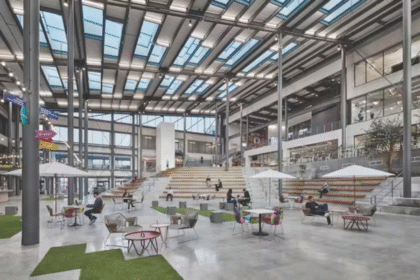Introduction
The way we work has changed dramatically over the past decade. Remote work, freelancing, and hybrid schedules are no longer experimental — they’re the new normal. In response, the concept of coworking spaces has evolved from shared office desks to flexible hybrid work environments.
Hybrid coworking spaces are designed to balance the benefits of physical office infrastructure with the flexibility of remote work. In India, these spaces are revolutionizing how startups, freelancers, and corporate teams operate, fostering productivity, collaboration, and innovation. At TheCoworkingSpace.in, we’ve seen firsthand how hybrid coworking spaces are bridging the gap between conventional office culture and modern flexible work requirements.
What Is a Hybrid Coworking Space?
A hybrid coworking space combines on-site office facilities with remote work solutions. Unlike traditional coworking, which focuses primarily on physical space, hybrid coworking offers:
-
Flexible Desk Options: Hot desks, dedicated desks, and private offices that can be booked as needed.
-
Remote Collaboration Tools: Cloud-based applications, virtual meeting rooms, and AI-enabled scheduling systems.
-
Community & Networking Opportunities: Both online and offline platforms to connect with peers, mentors, and clients.
-
Event Spaces: Areas designed for workshops, product launches, and networking sessions.
In short, hybrid coworking allows professionals to work from anywhere without losing access to a professional office ecosystem.
Why Hybrid Coworking Is Becoming Essential in India
The rise of hybrid coworking spaces in India is driven by several factors:
1. Changing Workforce Dynamics
India’s workforce is increasingly mobile and tech-savvy. Many startups and corporates have adopted hybrid or flexible work policies, reducing the need for fixed office spaces. Hybrid coworking spaces provide a professional infrastructure that supports this transition.
2. Cost Efficiency
Traditional offices come with high rental costs, utility bills, and maintenance. Hybrid coworking spaces reduce overheads through flexible membership plans — pay only for the desks and resources you use. This model is especially appealing to startups and freelancers.
3. Work-Life Balance
Long commutes, crowded offices, and rigid schedules can reduce productivity. Hybrid coworking allows professionals to choose when and where they work, enabling a healthier work-life balance without compromising professional goals.
4. Networking & Community
Even when working remotely, professionals still need collaboration opportunities. Hybrid coworking spaces foster both physical and digital networking, connecting members to peers, clients, and mentors.
5. Adaptability for Businesses
Startups and SMEs often scale rapidly or pivot their operations. Hybrid coworking spaces provide scalable solutions, allowing businesses to expand or reduce office space according to evolving needs.
Key Features of Hybrid Coworking Spaces
Hybrid coworking spaces distinguish themselves through technology integration, flexibility, and community-focused services. Key features include:
Flexible Membership Plans: Daily passes, weekly packages, and monthly subscriptions cater to diverse work requirements.
Smart Office Technology: Virtual meeting rooms, AI-powered desk booking, and cloud collaboration tools ensure seamless connectivity for both in-office and remote employees.
Community Zones: Networking lounges, cafes, and breakout areas promote collaboration and informal idea-sharing.
Event Spaces: Hybrid coworking centers often host workshops, webinars, and skill-building sessions that blend in-person and online participation.
24/7 Access: Many spaces allow round-the-clock access to accommodate professionals working across different time zones or unconventional schedules.
Support Services: Admin support, IT assistance, and mail handling help businesses focus on core operations rather than daily logistics.
Benefits for Professionals and Startups
For Freelancers
Freelancers benefit from hybrid coworking spaces by enjoying a professional environment without the burden of full-time office rental. The community aspect also provides networking opportunities and reduces isolation, which is common in home-based setups.
For Startups
Startups often need dynamic spaces that can scale quickly. Hybrid coworking allows startups to access high-quality infrastructure, meeting rooms, and tech facilities without long-term commitments, while still providing visibility and professional credibility.
For Corporates
Large corporations adopting hybrid work models can leverage coworking spaces to reduce overhead costs while providing employees with flexible options. Access to multiple coworking locations also enables employees to work closer to home.
Community and Collaboration Benefits
Hybrid coworking spaces encourage interaction across industries, leading to innovative partnerships. For example, a marketing freelancer might collaborate with a startup founder, leading to new business opportunities.
Examples of Hybrid Coworking in India
Cities like Bengaluru, Mumbai, Pune, and Gurugram are at the forefront of hybrid coworking adoption. Some trends observed include:
-
City-Based Hubs: Central coworking locations combined with suburban branches to support hybrid schedules.
-
Tech-Integrated Operations: AI-driven desk booking, smart meeting rooms, and cloud-based collaboration tools.
-
Flexible Office Formats: Options for hot desks, private offices, and shared studios to suit different team sizes.
One Bengaluru-based startup shared that hybrid coworking allowed their team to work remotely 60% of the time while still hosting client meetings in professional spaces — increasing productivity and reducing overhead by nearly 40%.
The Role of Technology in Hybrid Coworking
Hybrid coworking spaces rely heavily on technology to connect in-person and remote members. Key tools include:
-
Cloud Collaboration Platforms: Slack, Trello, and Microsoft Teams facilitate communication and project management.
-
Virtual Meeting Rooms: Zoom, Google Meet, and proprietary apps enable seamless client presentations and team collaboration.
-
AI-Powered Space Management: Desk booking, attendance tracking, and resource allocation are automated, optimizing workspace usage.
By integrating technology, hybrid coworking spaces ensure that physical distance does not become a barrier to productivity.
The Future of Hybrid Workspaces in India
As remote work continues to grow, hybrid coworking will evolve into an even more integrated, adaptive, and sustainable solution. Future developments may include:
-
AI-Enhanced Workspaces: Predictive tools for workspace allocation, meeting scheduling, and personalized work environments.
-
Sustainability Integration: Eco-friendly designs and energy-efficient operations will become standard.
-
Expansion Beyond Major Cities: Tier-2 and Tier-3 cities will see growth in hybrid coworking spaces, enabling professionals to work closer to home.
-
Specialized Industry Hubs: Coworking spaces focused on fintech, creative industries, or wellness may offer hybrid solutions tailored to sector needs.
Hybrid coworking spaces represent a flexible, resilient, and future-ready approach to work in India.
Conclusion
Hybrid coworking spaces are redefining work in India by blending flexibility, technology, and community. For freelancers, startups, and corporates alike, these spaces provide the perfect balance between remote convenience and professional infrastructure.
At TheCoworkingSpace.in, we connect professionals with India’s leading hybrid coworking spaces — offering flexible solutions for productivity, collaboration, and growth. Explore the future of work today and discover a workspace that adapts to your lifestyle.
Visit TheCoworkingSpace.in to find hybrid coworking spaces across India that meet your professional needs.





